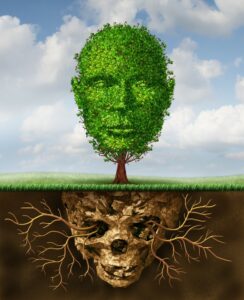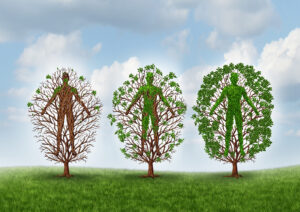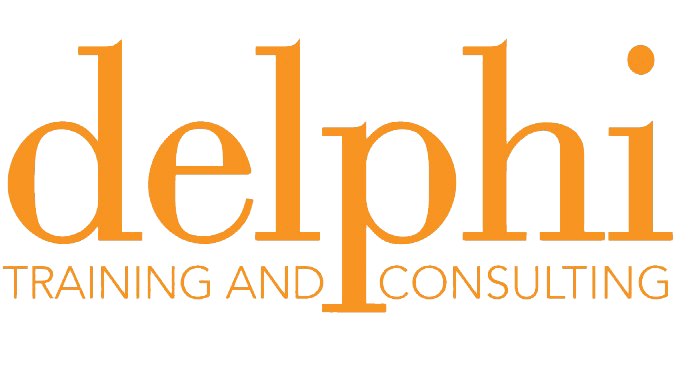Part 1 explores the definition and experience of moral injury and professions at risk.
Part 2 differentiates moral injury from other psychosocial risks and mental health diagnoses, with guidelines toward healing the invisible wound systemically and personally.
Moral Distress
The concept ‘moral distress’ (MD) was developed by philosopher Andrew Jameton, in his 1984 book, Nursing Practice: The Ethical Issues. Jameton described MD as the psychological conflict nurses experience when faced with ethical dilemmas. He proposed that MD “arises when one knows the right thing to do, but institutional constraints make it nearly impossible to pursue the right course of action.” (1).
During the COVID-19 pandemic in some countries healthcare workers were placed in the position of deciding who was put on a ventilator and who was not. Since 7 October 2023, medical personnel in Gaza have been forced to make decisions about who does or does not receive treatment with many operations performed without pain killers and other lifesaving equipment.
Moral Injury
In the 1990s, psychiatrist, Jonathan Shay and his colleagues working with veterans observed deep distress in soldiers where in the line of duty they were involved in events that transgressed deeply held personal morals, values and/or spiritual beliefs. Shay coined the term ‘moral injury’ (MI) to describe veterans suffering (2).
In a 4 Corners episode exposing the failures of the NSW public mental health system, aired on 2 June 2025, consultant psychiatrist, Dr. Suzy Goodison said, “I was burning out, a strong sense of moral injury… how did I end up here…” (3).
The International Centre for Moral Injury describes MI as “a profound sense of broken trust in ourselves, our leaders, governments and institutions to act in just and morally ‘good ways’ and the experience of sustained and enduring negative emotions – guilt, shame, contempt and anger – that results from the betrayal, violation or suppression of deeply held or shared moral values” (4). This definition broadens the risk of moral injury beyond the medical profession and the military to encompass societal experience related to actions and inactions of governments. The failure of the Indigenous Voice to Parliament referendum may be experienced by many as a recent Australian experience of MI. Civilian protests across the world condemning the actions of Netanyahu’s government in Gaza, defined as genocide by UN Special Rapporteur on the situation of Human Rights in the occupied Palestinian territories, Francesca Albanese, and what they believe to be inadequate responses by their own governments, may reflect MI at a global level.
A psychosocial risk in the workplace
The terms moral distress and moral injury are often used interchangeably. For simplicity, the term moral injury will be used to encompass both. In recent years two notable issues have been identified related to MI. Firstly, it was found to be a significant factor in resignations across many industries (6). Secondly, associations were made between MI and complex-Post Traumatic Stress Disorder (c-PTSD) (7). Similarities and differences between various diagnoses and psychological experiences will be discussed in Part Two.
Lawyers are routinely exposed to trauma in family law, human rights, personal injury, employment and industrial law, and in criminal cases. The adversarial nature of law can place lawyers in situations where they may be forced to make choices that conflict with personal values. There can be a moral tension in representing individuals or organisations whose actions or beliefs clash with their own. MI risk factors include systemic issues such as cuts to legal aid, societal stigma surrounding certain groups or organisational practices that prioritise profit over ethics. Indeed, the perception some of the public hold about the legal profession itself, with slurs such as ‘ambulance chasers’ or worse, can be injurious.
MI is commonplace in child protection, youth work, domestic violence and sexual assault services and the police force. Causes include systemic restraints, such as policies, funding limitations and bureaucratic red tape; being forced to leave a child in a non-therapeutic situation because there are no available places or support options; witnessing harm to children, families or colleagues due to legal or institutional barriers; carrying out directives that feel ethically wrong but are legally required, such as removing a child from the family home and being the public face of a system that harms and held responsible for systemic failures (8,9). Police investigating online child sexual abuse material (CSAM) are at significant risk of many harms, including MI (10). The judiciary is exposed to high levels of traumatic material, pressures of workload, systemic flaws and failures which can result in secondary trauma, vicarious trauma, burnout and MI (11, 12). The requirement to remain impartial or compelled to make decisions that conflict with personal values may be experienced as a failure of justice within the legal system and experienced as a MI. Compartmentalising normal and healthy emotional responses to distressing material or behaviour to remain impartial can take a toll (13).
The United Nations is facing mammoth funding shortfalls across all agencies. In March 2025 UN Secretary-General António Guterres laid out system-wide reform plans to make the “UN more effective, nimble, and fit for the challenges of today and tomorrow.” The UN-80 reform will see twenty percent of jobs axed over the next three years. None of the top layer of 88 cabinet minister-rank Under Secretary General posts are on the chopping block. Meanwhile, Secretary-General António Guterres, quietly, and some would say secretly, promoted a fellow Portuguese staffer to the rank of assistant secretary-general, although their official job title, Director, has not changed (14). Notwithstanding legitimate criticism of the UN there are thousands of staff members who have pursued careers in the UN because they believed in the UN Charter and undertake important work with commitment and integrity. Many junior and mid-level personnel are employed on short-term contracts and will be cut loose with little or no benefits. Job, financial security, professional identity and social networks are among the losses being faced. For these dedicated professionals there is a profound sense of abandonment and betrayal. In the words of one manager, “I feel overwhelmed and hopeless. I’m directed to implement decisions I don’t necessarily agree with, and I see the impact it’s having on my staff and our service. I feel like I’m failing everybody, and I’m also fearful as I don’t know if my post is slated to be cut.” (15).
A psychologist, who is also a practising Catholic, described a profound MI and crisis of faith working with victim-survivors of institutional sexual abuse within the Catholic Church (16).
Sexual harassment and assault can result in MI, particularly where there is an expectation or pressure to remain silent or when the victim-survivor is abandoned by inadequate actions of the institution where it occurred (17). Freyd describes this as institutional betrayal, “wrongdoings perpetrated by an institution upon individuals dependent on that institution, including failure to prevent or respond supportively to wrongdoings by individuals (e.g. sexual assault) committed within the context of the institution” (18).
MI is a central factor in whistleblowing. In too many instances the original wound that led to blowing the whistle is deepened through inactions of the organisation in addressing the wrongdoing or actively targeting the whistleblower. These harms are compounded by inadequate whistleblower protection. Whistleblowing as it currently stands in Australia is a risky business (19).
On 26 June 2024, Richard Boyle, the Australian Tax Office whistleblower posted the following on X (formerly Twitter) after losing his appeal for protection under the Public Interest Disclosure Act at the South Australian Court of Appeal,
“I have a question that is important to me, and that burns like a white-hot flame: Have we lost the ability as a society to even recognise, let alone understand, and then to clearly and articulately tell the truth?
I truly wonder whether it is worth continuing, or, like others before me, whether one should roll over and concede that the so-called elite are too hard to hold to account, and that the corruption, malfeasance and shitfuckery cannot be stopped? Let them have their way with me. Let my hair grow silvery and dishevelled like #Assange – thank god he is still alive! – at the long, slow, painful experience that a supposed lone truth teller takes in their journey forward, into their vision, and version, and lived reality, of their truth as they see it.
I ask, when will it stop? How much is enough? Do you want my tears Mr Dreyfus and Mr Albanese? Do you want to crush my bones into dust to make your bread? When will it be enough for the institutions of government and justice to see what is really going on in the Australian Public Service, and the enormous toll and cost it inflicts upon society, not to mention the hell that is unleashed on public servants themselves?
Shame on those that continue to force this horrible predicament upon truth tellers: whether to die withering on the vine, or to go out in blaze of light proclaiming the virtues of the Goddess of Justice, and sacrificing themselves, spilling their own entrails on the altar and fire of truth? I fear we have very little time left as a species to address this issue ……. I leave this here as a manifesto and a record of where I stand, on this day, when I can resolutely claim that we are almost sunk, and that I have all but lost hope.
Shame on those who sell out. And shame on those that promote and support this selling out, due to their cover up and tacit approval of institutional abuse. I would rather die, than accede to this torture. Instead, I am determined to fight on. Long live Δημοκρατία.” (20).
Boyle’s words go to the heart of moral injury and betrayal blindness defined by Freyd as, “victims, perpetrators, and witnesses may display betrayal blindness in order to preserve relationships, institutions, and social systems upon which they depend” (21). A further injury inflicted upon victims of institutional betrayal is being subjected to DARVO (22). The whistleblower, child victim of sexual abuse or adult victim of domestic violence is rebranded as the wrongdoer.
On 27 May 2025, Boyle pleaded guilty to four criminal charges related to his actions exposing unethical debt collection practices within the ATO. Upon Boyle’s guilty plea, Kieran Pender, Human Rights Law Centre, had this to say. “This is a heartbreaking day for Richard Boyle and whistleblowers in Australia. While it is welcome that Boyle will avoid jail, he should never have been prosecuted, and his case clearly demonstrates how our laws are failing to protect people who bravely speak up.” (23).
Moral injury is an invisible wounding of profound intrapsychic harm. It is imperative at-risk professions, and as a society we lift the veil of betrayal blindness, assist those who are suffering and take measures to address the systemic failures that inflict and perpetuate MI.
References:
- Jameton, , Nursing Practice: The Ethical Issues, (1984) Englewood Cliffs, NJ: Prentice Hall
- University, Durham. “What is Moral Injury? – Durham University”
- 4 Corners, Emergency, ABC, 2 June 2024
- Litz, Brett T.; Stein, Nathan; Delaney, Eileen; Lebowitz, Leslie; Nash, William P.; Silva, Caroline; Maguen, Shira (December 2009). “Moral injury and moral repair in war veterans: A preliminary model and intervention strategy”. Clinical Psychology Review. 29(8): 695–706.
- Praslova, Ludmila N. (2022). Feeling distressed at work? It might be more than burnout. Fast Company, January 14, 2022
- Ron Carucci and Ludmila N. Praslova (2022). Employees Are Sick of Being Asked to Make Moral Compromises. Harvard Business Review, February 21, 2022.
- Jovarauskaite L, Murphy D, Truskauskaite-Kuneviciene I, Dumarkaite A, Andersson G, Kazlauskas E (2022). “Associations between moral injury and ICD-11 post-traumatic stress disorder (PTSD) and complex PTSD among help-seeking nurses: a cross-sectional study”. BMJ Open. 12 (5): e056289. doi:10.1136/bmjopen-2021-056289. PMC 9086640. PMID 35534083
- Frontline Mental Health Conference (2025)
- Johnanna Ganz, Ph.D., J. Ganz Consulting, LLC (2025) How does moral injury show up in the domestic and sexual violence field and what can advocates do about it?, 21 March 2025 https://vawnet.org/news/how-does-moral-injury-show-domestic-and-sexual-violence-field-and-what-can-advocates-do-about retrieved 21/7/2025
- Tapson, K., Doyle, M., Karagiannopoulos, V., Lee, P. (2021) Understanding Moral Injury and Belief Change in the Experiences of Police Online Child Sex Crime Investigators: an Interpretative Phenomenological Analysis, Journal of Police and Criminal Psychology (2022) 37:637–649
- Schrever, C., Hulbert, C., Sourdin, T., (2024) The privilege and the pressure: judges’ and magistrates’ reflections on the sources and impacts of stress in judicial work, Psychiatry, Psychology and Law, 31:3, 327-380, DOI: 10.1080/13218719.2024.2335913
- Schrever, C., Hulbert, C., Sourdin, T., (2019) The psychological impact of Judicial work: Australia’s first empirical research measuring judicial stress and wellbeing, Judicial College of Victoria, 28 JJA 141
- Lee, J. Judges seek help to cope with trauma of hearing serious crime cases, The Age, April 2, 2015, https://www.theage.com.au/national/victoria/judges-seek-help-to-cope-with-trauma-of-hearing-serious-crime-cases-20150401-1mcjrf.htmlretrieved 21/7/2025
- Banjo, D., UN Boss Promotes Fellow Countryman Amid Widespread Job Cuts, PassBlue, 23 June 2025, https://passblue.com/2025/06/23/un-boss-promotes-fellow-countryman-amid-widespread-job-cuts/
- Personal Communication
- Personal communication
- Lopesa, J., McKinnonb, M.C., Tam-Setoc, L., (2023) Adding insult to injury: Exploring the relation between moral injury and military sexual trauma, Journal of Military, Veteran and Family Health, Vol 9. No. 4, 27 June 2023
- Freyd, J.J., “Institutional Betrayal”. Freyd Dynamics Lab, University of Oregon. Retrieved October 23, 2021.
- Halpern, N. (2024) In the public Interest: Whistleblowers and Institutional Betrayal.
- Boyle, R. 26 June 2024, X (formerly Twitter)
- Freyd, J.J., & Birrell, P. (2013). Blind to betrayal: Why we fool ourselves we aren’t being fooled. John Wiley & Sons.
- Freyd, J.J. (1997) Violations of power, adaptive blindness, and betrayal trauma theory. Feminism & Psychology, 7, 22-32.
- Human Rights Law Centre https://www.hrlc.org.au/news/tax-whistleblower-richard-boyle-guilty-plea/ Retrieved 15/7/2025
Part 2 coming soon!







